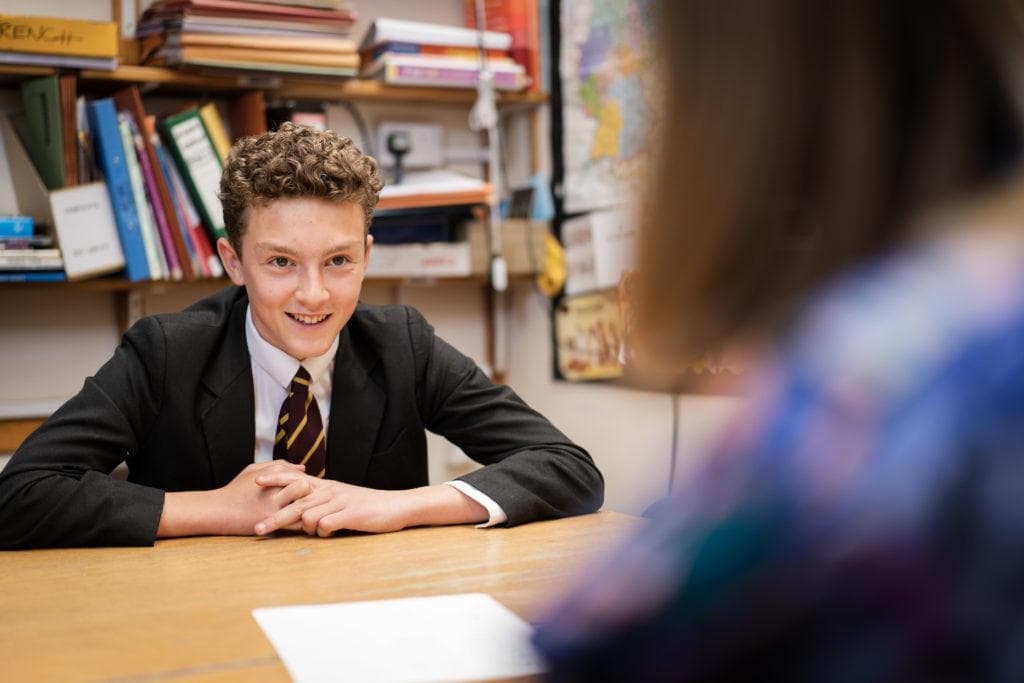Acquiring an understanding of a language which is both strikingly similar to English while also having very different grammatical structures.

It is generally agreed today, that an ability to speak and understand other languages is an extremely important skill.
The German department offers students the opportunity to learn a Teutonic language in addition to their first ‘Romance’ language French or Spanish, learned from Year 7. It offers different challenges from the learning of their first language, combining some very familiar spellings with a rather more rigid grammatical structure (a case system based on Latin, for example), and students enjoy the challenge of dealing with some very un-English sentence patterns.
German speakers are increasingly sought after in today’s world of business, science and technology. It is the language of Germany, Austria and partly of Switzerland and is a second language to many other Europeans. Learning the German language allows access to a wide range of cultural interests. German literature has long been popular, with writers ranging from Goethe to more modern playwrights like Bertolt Brecht, while German cinema has undergone a resurgence in recent years, with a number of highly successful directors and writers coming to the fore.
Throughout the three year course to GCSE, emphasis is placed on comprehension and communication, where students are encouraged to express and justify their ideas.
Middle School
German becomes an option in Year 9, meaning that there are just three years of learning up to GCSE. At GCSE we follow the Edexcel specification. In the first year we concentrate on vocabulary acquisition and learning the basic grammatical structures. One good thing about German is that the pronunciation is regular and logical. By the end of Year 9 pupils will be able to deal in German with a range of everyday situations and will already have learned the past tenses. Years 10 and 11 form the basis of the GCSE course, where students continue to develop their grammatical knowledge and their competence in the four basic language skills. The topics covered are more demanding, dealing with lifestyle, health and fitness, holiday and leisure and education and work. Assessment will be by final examination in the four language skills.

Throughout Middle School, German students get additional support in small groups with the German language assistant. In no small part, this helps to prepare them for the Christmas market trip and for the proposed language and culture trips at Easter.
Sixth Form
The two year A Level course covers a range of social, cultural and political topics relating to Germany and German speaking countries.
Skills built up during the GCSE course are extended and developed and new language and structures are introduced, allowing the student to function at a higher linguistic level. Much emphasis is placed on developing an understanding of aspects of German culture and in the course of the two years you will study one literary text and one modern German film.
Students will have one lesson a week on a one-to-one basis with the German language assistant, in order to prepare for the oral examination at the end of Year 13. A major part of this oral examination will be a discussion of the student’s own individual research project, based on some element of German culture or society.
In addition, students will develop skills in translation, both to and from the target language and in writing critical and analytical essays in the target language. All these skills can be seen as essential preparation for university study.
In Year 12, the following topics will be studied:
• Media
• The German Education system
• Music in Popular Culture
• The World of Work
• Festivals and traditions
• A German Film
• Nature and the environment
In Year 13, the following topics will be studied:
• Immigration and Multicultural Society
• Germany since re-unification
• East Germany society before re-unification
• A work of German speaking literature
• An independent Research topic
At the end of Year 13, there are three exams: a Comprehension paper with Listening and Reading tasks; a Writing paper, comprising two essays and a translation; an Oral exam.
Exam results
The average of the results in German over the most recent three year period (2023, 2022, 2021) is:
| GCSE | |
| 9 | 19% |
| 9-8 | 43% |
| 9-7 | 52% |
| 9-4 | 93% |
| A Level | |
| A* | 29% |
| A* – A | 86% |
| A* – B | 100% |

